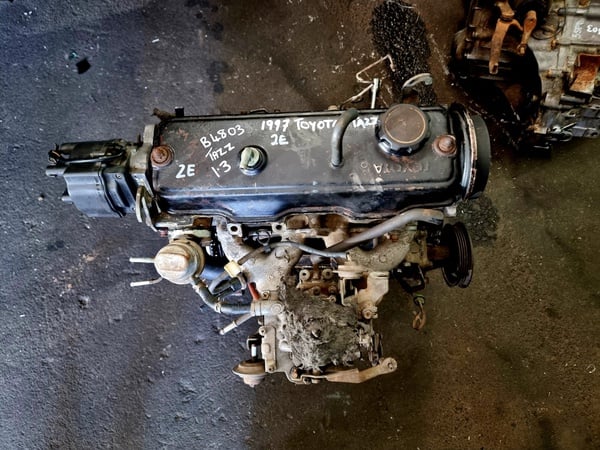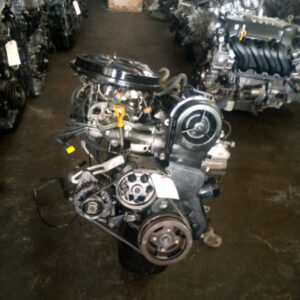Toyota Tazz: A Comprehensive Review of Performance and Comfort
Toyota Tazz: A Comprehensive Review of Performance and Comfort
Blog Article
Check Out the most up to date Fads in Engine Technology Through Tazz
In the swiftly advancing landscape of automotive innovation, Tazz stands at the leading edge, highlighting significant advancements in engine systems that prioritize both innovation and sustainability. tazz. From crossbreed engines that maximize gas performance to the development of hydrogen gas cells, the fads shaping contemporary powertrains are not just boosting performance however additionally attending to important environmental challenges. As the sector continues to push borders, it is vital to think about how these developments will affect future transportation solutions and the wider effects for international energy intake. What exists in advance in this pivotal transformation?
Crossbreed Engine Innovations
Crossbreed engine technologies stand for a pivotal shift in automotive modern technology, incorporating the advantages of interior combustion engines with electrical propulsion systems. This combination not just enhances fuel performance however also minimizes emissions, conference progressively rigid environmental laws. By using both energy resources, hybrid engines can enhance efficiency, supplying power when needed while preserving gas during less requiring driving conditions.
Recent advancements in hybrid modern technology consist of enhancements in battery efficiency and regenerative braking systems. These technologies permit higher power recuperation throughout slowdown, which can be rerouted to help in velocity or power auxiliary systems. Manufacturers are focusing on lightweight materials and small styles to take full advantage of the performance of crossbreed powertrains.
The advancement of plug-in crossbreeds has actually also broadened the marketplace, making it possible for drivers to bill their vehicles utilizing typical electric outlets. This function frequently allows for substantial all-electric array, additional lowering dependancy on standard gas. tazz. As the automotive industry remains to progress, hybrid engine technologies are anticipated to play a critical role in connecting the space in between standard automobiles and completely electric models, offering a transitional service that caters to diverse consumer demands and choices
Developments in Electric Powertrains
The automobile landscape is quickly developing, with electrical powertrains becoming a leading pressure in lasting transportation. Breakthroughs in electric vehicle (EV) modern technology are dramatically improving efficiency, effectiveness, and user experience. Trick innovations include enhancements in battery chemistry, which have enhanced energy density, minimized charging times, and extended total battery life.
Solid-state batteries, for instance, assure to revolutionize the market by providing greater security and effectiveness contrasted to standard lithium-ion cells. Improvements in regenerative stopping systems are enabling vehicles to recover energy throughout deceleration, contributing to general efficiency.
In enhancement to battery innovation, electric motor layouts are ending up being more sophisticated. Advancements such as incorporated motors and advanced thermal administration systems are helping to optimize power shipment and lower weight, ultimately enhancing automobile characteristics.

Collectively, these advances emphasize the commitment to change in the direction of cleaner, a lot more efficient transportation services, positioning electric powertrains at the center of vehicle development.
The Increase of Hydrogen Gas Cells
Significantly, hydrogen fuel cells are acquiring grip as a feasible choice to traditional internal combustion engines and battery electric cars. This innovation takes advantage of the chemical power saved in hydrogen, transforming it into electricity with an electrochemical response with oxygen. The primary byproduct of this process is water, making hydrogen gas cells an environmentally friendly alternative with no exhausts at the tailpipe.

Automakers are increasingly purchasing hydrogen fuel cell modern technology, identifying its potential for long-range applications and fast refueling capabilities that rival traditional fuels. In addition, sectors such as durable transport and public transit are specifically appropriate for hydrogen gas cells, where battery electric options may drop short due to weight and array limitations.
As research and investment remain to expand, hydrogen gas cells are poised to play a considerable function in the future landscape of clean transport and power remedies.
Enhancements in Internal Combustion Engines
Innovations in inner burning engine (ICE) innovation are changing traditional cars to meet modern ecological criteria and efficiency assumptions. Direct gas shot, for circumstances, enables for better atomization of fuel, leading to even more complete combustion and boosted power output.
In addition, turbocharging has acquired prominence, allowing smaller sized engines to deliver higher efficiency without the weight of larger engines - tazz. This innovation not just increases performance yet likewise adds to reduce gas intake. Variable valve timing systems are also being fine-tuned, making it possible for engines to adapt to various driving conditions for improved torque and responsiveness
Furthermore, using lightweight materials in engine construction is coming to be conventional, more improving gas efficiency by lowering overall lorry weight. Engine control devices (ECUs) are increasingly innovative, allowing real-time changes that optimize performance and exhausts.
These improvements collectively represent an essential shift in ICE innovation, lining up with worldwide sustainability objectives while still providing the performance vehicle drivers anticipate from their lorries. As the industry advances, these renovations proceed to websites form the future of traditional vehicle design.
Future Patterns in Engine Effectiveness
Substantial improvements in engine effectiveness are prepared for as manufacturers concentrate on integrating cutting-edge technologies to satisfy strict environmental policies and consumer demands. The shift towards electrification, crossbreed systems, and alternate fuels is reshaping the auto landscape, driving technologies that improve fuel economic climate and decrease discharges.
One of the vital trends is the application of innovative materials and making techniques. High-strength alloys and lightweight composites contribute to lowered lorry weight, hence improving overall effectiveness. Additionally, the fostering of turbocharging and variable valve timing technologies enables for boosted power output from smaller engines, better boosting gas economic climate.

Conclusion
To conclude, the exploration of engine innovation reveals significant advancements that prioritize sustainability and efficiency. Technologies in crossbreed engine systems, electric powertrains, and hydrogen gas cells show a dedication to reducing click here to find out more emissions while boosting performance. In addition, renovations in interior combustion engines and a concentrate on lightweight materials add to general engine effectiveness. As the automobile sector proceeds to advance, these fads will play a crucial role in shaping a cleaner and even more lasting future for transport.
From hybrid engines that maximize fuel efficiency to the development of hydrogen gas cells, the patterns forming modern-day powertrains are not only improving performance however also resolving crucial environmental obstacles.Hybrid engine innovations represent a crucial shift in vehicle technology, integrating the advantages of interior visit here burning engines with electrical propulsion systems.Additionally, turbocharging has actually gotten importance, enabling smaller engines to supply greater efficiency without the weight of bigger engines. Furthermore, the adoption of turbocharging and variable valve timing technologies enables for improved power result from smaller sized engines, even more boosting fuel economic climate.
Renovations in inner burning engines and an emphasis on light-weight products contribute to total engine performance.
Report this page